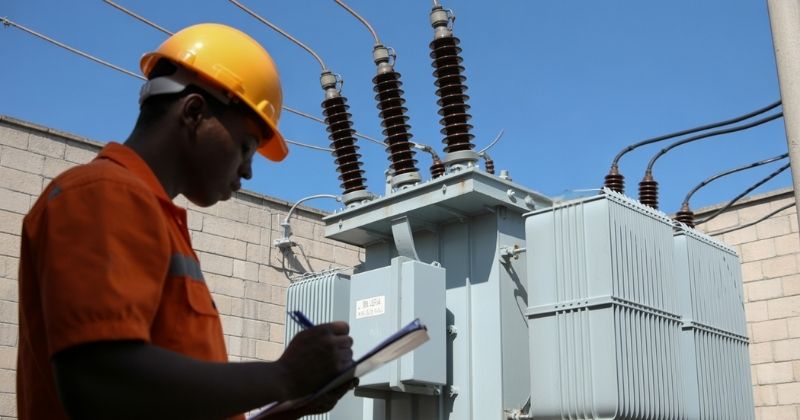
The rand experienced a decline on Thursday as investor sentiment turned risk-averse, driven by the ongoing conflict between Israel and Iran, which had entered its seventh consecutive day. Market participants reacted cautiously to the escalating situation, contributing to currency movements. Investors worldwide are watching the situation closely, with fears mounting that the longer the conflict continues, the greater the impact on global markets, trade routes, and commodity prices could become.
Key Takeaways
- Rand Under Pressure from Geopolitical Tensions: The South African rand weakened significantly due to heightened global risk aversion linked to the ongoing Israel-Iran conflict, reflecting broader emerging market instability and investor flight to safer assets.
- Local Power Grid and Economic Concerns Mount: Eskom’s load shedding risk remains high as unplanned outages continue to exceed safe thresholds. At the same time, South Africa’s economic uncertainty is now considered worse than during early Covid-19 conditions, driven by external risks and weak infrastructure.
- Multiple Domestic Risks Weigh on Outlook: Reports highlight worsening air pollution, food supply vulnerabilities, and unresolved questions about employment data accuracy, pointing to a range of pressures that could affect social stability and economic resilience.
About Arcadia Finance
Secure your loan with ease through Arcadia Finance. Compare offers from 19 trusted lenders, all registered with South Africa’s National Credit Regulator. Enjoy a smooth application process, no fees, and personalised options to suit your financial needs.
By Thursday, the rand was trading at 18.07 against the United States dollar. This represented a decrease of approximately 0.3 percent compared to Wednesday’s closing rate and brought the currency close to its weakest level in a month. The rand’s struggle has been exacerbated by broader emerging market outflows, with global investors opting for currencies like the dollar and Swiss franc that are traditionally viewed as safe during periods of geopolitical instability.
This downward trend reflected a broader pattern across emerging market currencies, as global investors moved their capital into safe-haven assets. The shift was influenced by growing concerns over potential United States involvement in the Middle East conflict, which has amplified market uncertainty.
If tensions escalate further, South Africa’s rand may face even sharper losses, potentially breaching key technical support levels.
At the domestic level, six of South Africa’s largest banks successfully completed the country’s first-ever climate-risk stress test. The exercise, conducted by the South African Reserve Bank, aimed to evaluate the resilience of the national financial system in the face of climate-related risks. The results provide some reassurance that the banking sector can withstand future environmental shocks, which are expected to become more frequent due to global climate change.
Friday, 20 June, the rand had firmed slightly to trade at R18.01 to the dollar, R24.30 to the British pound, and R20.75 to the euro. Meanwhile, the price of oil was marginally lower at $77.27 per barrel. The stabilisation in the oil price is offering some relief to South African consumers already burdened by rising fuel costs and inflationary pressures.
To grasp the true economic strain, it helps to understand the data behind it. From GDP dips to employment rates, we break down what financial indicators reveal about South Africa’s recovery and resilience.

Load Shedding Warning
Eskom reported that scheduled load shedding should not be required during the winter period, provided that unplanned generation outages remain below 13,000 megawatts. However, recent data showed that during mid-June 2025, unplanned outages had surpassed 14,800 megawatts for more than half of the time, raising renewed concerns over power supply stability. Energy experts caution that if this trend persists, South Africans could face another round of severe load shedding at the peak of the cold season, placing additional strain on households and businesses.
Economic Uncertainty Exceeds Covid-19 Levels
Although the South African financial system is assessed as remaining stable, there is growing concern over rising geopolitical tensions, fragile domestic infrastructure, and an increased risk of sudden capital outflows. According to Nicola Brink, head of the Reserve Bank’s financial stability division, the present state of global financial instability is now comparable to, and in certain aspects more severe than, the situation seen during the early stages of the Covid-19 pandemic. Economists warn that the combined pressures of local energy insecurity, mounting inflation, and deteriorating investor confidence could lead to weaker growth forecasts and potentially affect future employment levels.
Despite widespread frustration, there have been recent developments offering a glimmer of hope for consumers reliant on Eskom. Discover encouraging news for South Africans using Eskom and how these updates could ease the pressure on households and small businesses.

Air Quality Health Risks
A new report has revealed that even relatively low concentrations of air pollution may raise the risk of serious health conditions, including cancer, heart disease, strokes, mental health disorders, and dementia. The World Health Organisation has recommended a target particulate level of 5. In contrast, the current reading for South Africa stands at 20, underscoring significant public health concerns. Environmental groups are urging faster government intervention, arguing that inaction on air quality could place even greater strain on the public healthcare system, which is already under significant pressure.
Food Shortage Concerns Remain
Despite a partial relaxation of restrictions on poultry imports from Brazil following the avian flu ban, South Africa still faces a potential risk of food shortages. Ongoing production delays and extended shipping times continue to threaten food supply chains, particularly impacting smaller and more vulnerable suppliers across the country. Retailers and wholesalers are now racing to secure alternative sources of key food products, while food inflation threatens to climb higher in coming months if supply disruptions worsen.
Capitec CEO Comments on Unemployment Statistics
Capitec’s outgoing Chief Executive Officer, Gerrie Fourie, expressed the view that South Africa’s true unemployment rate may be lower than officially reported, due to insufficient counting of informal sector activities. Drawing on his experience overseeing more than 400 Capitec branches in township areas, he observed vibrant local economies in communities such as Tembisa and Vosloorus. He suggested that policymakers might not fully appreciate the level of economic activity occurring within these regions. However, labour analysts argue that informal trade alone cannot compensate for formal job creation, and more comprehensive efforts are needed to address structural unemployment in the broader economy.
Conclusion
South Africa faces a volatile mix of global and domestic challenges, with the rand under pressure from geopolitical instability and internal risks ranging from energy insecurity to environmental health threats. While key financial institutions show resilience through stress testing, broader concerns over inflation, unemployment, and supply disruptions persist. Without sustained interventions, the country’s fragile economic environment may deteriorate further in the months ahead.
Fast, uncomplicated, and trustworthy loan comparisons
At Arcadia Finance, you can compare loan offers from multiple lenders with no obligation and free of charge. Get a clear overview of your options and choose the best deal for you.
Fill out our form today to easily compare interest rates from 19 banks and find the right loan for you.

